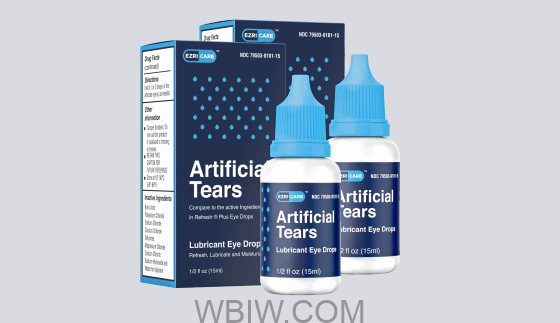
INDIANA – One person has died and at least three other people have permanent vision loss because of a bacterial infection possibly linked to a brand of over-the-counter eyedrops, said the Centers for Disease Control and Prevention, which urged consumers to stop using EzriCare Artificial Tears while it investigates the outbreak.
Others had respiratory infections or urinary tract infections. One person died when the bacterium entered the bloodstream.

On Thursday, the maker of the eyedrops recalled them because of possible contamination.
The eyedrops had been sold online by Amazon and Walmart.
The FDA recommended this recall due to the company’s current good manufacturing practice (CGMP) violations, including lack of appropriate microbial testing, formulation issues (the company manufactures and distributes ophthalmic drugs in multi-use bottles, without an adequate preservative), and lack of proper controls concerning tamper-evident packaging.
A majority of those affected reported using preservative-free EzriCare Artificial Tears before they became ill, said Maroya Spalding Walters, head of the CDC’s antimicrobial resistance team.
So far, the CDC has identified at least 55 people in 12 states with Pseudomonas aeruginosa, a type of bacterium resistant to most antibiotics. Cases have been reported in California, Colorado, Connecticut, Florida, New Jersey, New Mexico, New York, Nevada, Texas, Utah, Washington, and Wisconsin.
Three-quarters of the patients said they’d used artificial tears before they developed infections. Of those who were able to recall brand names, 85% said they’d used preservative-free EzriCare Artificial Tears, Walters said. The CDC first alerted the public to the potential danger in a statement dated Jan. 20.
Symptoms of eye infection
According to the CDC, people who have used the eyedrops should seek medical care if they have symptoms, including:
- Yellow, green, or clear discharge from the eye.
- Eye pain or discomfort.
- Redness of the eye or eyelid.
- Feeling of something in your eye (foreign body sensation).
- Increased sensitivity to light.
- Blurry vision.
FDA also placed Global Pharma Healthcare Private Limited on import alert for providing an inadequate response to a records request and for not complying with CGMP requirements. The import alert prevents these products from entering the United States. FDA encourages health care professionals and patients to report adverse events or quality problems with any medicine to FDA’s MedWatch Adverse Event Reporting program:
- Complete and submit the report online at www.fda.gov/medwatch/report.htm; or
- Download and complete the form, then submit it via fax at 1-800-FDA-0178.
Consumers may also report adverse reactions by contacting FDA’s Consumer Complaint Coordinators.



